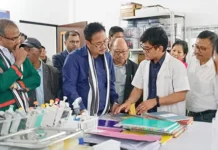ITANAGAR, 24 Sep: Scientists and experts emphasized the critical role of springs and springshed management in ensuring long-term water security amid increasing groundwater scarcity.
The North-East Regional Centre (NERC) for GB Pant National Institute of Himalayan Environment (GBPNIHE) recently organized a focal group discussion (FGD) on ‘Spring rejuvenation in the Himalayan region’ at Kimin, Papum Pare district, according to a release from GBPNIHE-NERC.
The programme, conducted under the ICIMOD-funded HI-REAP project, “Scaling ecosystem-based approaches in the Indian Himalayan region for climate adaptation and biodiversity resilience,” brought together around 50 participants, including experts, community leaders, and local villagers from Rayuk and Tadar Hapa.
Addressing the participants, Tridipa Biswas, Scientist-C at GBPNIHE-NERC, urged them to share their challenges and experiences, underlining the importance of collaborative solutions for safeguarding resources for future generations.
Experts from partner organisations contributed diverse perspectives on spring rejuvenation.
Ipsita Roy, senior project associate at North East Initiative Development Agency (NEIDA), highlighted the importance of hydro-geological assessments in effective rejuvenation and governance of spring ecosystems.
Rajat Gupta, assistant hydrogeologist at Central Ground Water Board (CGWB), stressed the need to revive springs with localised solutions, while GBPNIHE-NERC research officer Dr. Prem Ranjan discussed the interlinkages of spring health with farming, soil conservation, and overall water management.
Local leaders Tai Tassar from Tadar Hapa and Takam Rangka from Rayuk expressed strong support for the initiative.
Villagers from Rayuk and Tadar Hapa shared their lived experiences of worsening water scarcity, especially between February and April when springs run dry, severely affecting drinking water and agriculture.
“Many noted that the lack of reliable water has forced them to reduce or abandon vegetable cultivation in recent years,” the release said.
The FGD also encouraged community-led suggestions blending traditional knowledge with modern ecosystem-based approaches.
The participants agreed that collective action involving scientists, NGOs, policymakers, and local communities is vital for ensuring sustainable water security in the Himalayan region, the release added.
The FGD was organized in collaboration with NEIDA and CGWB.


